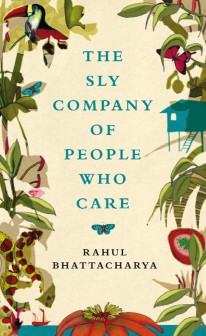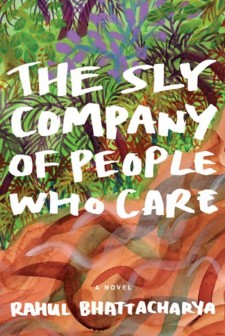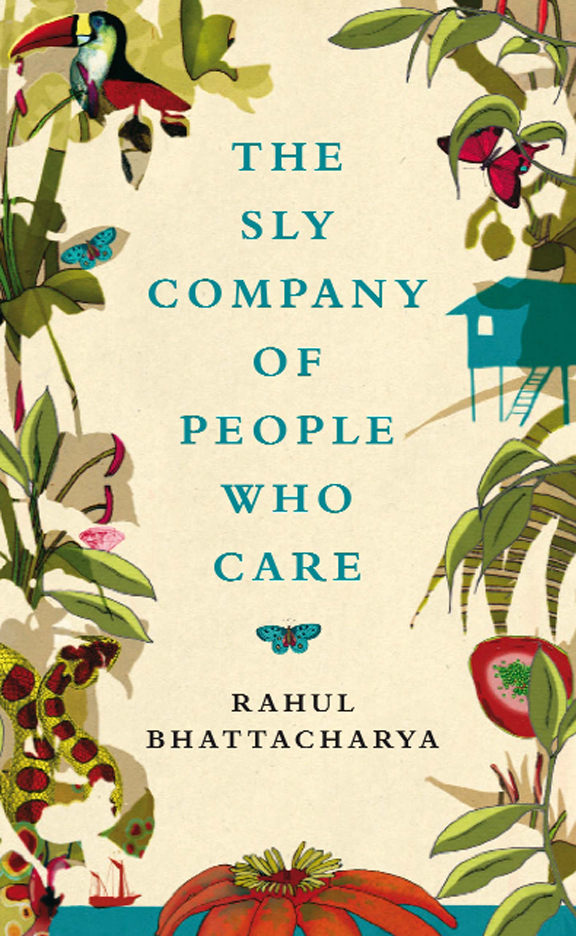By Brendan de Caires
The Sly Company of People Who Care by Rahul Bhattacharya (Farrar Straus and Giroux, 2011.- ISBN-10: 0330534734 | ISBN-13: 978-0330534734)
Georgetown – at least the city of my childhood – is not for the fainthearted. For practical purposes, I grew up there twice. First in a quiet nook of Campbellville, safely distant from the fleshpots of Sheriff Street, then downtown, a few blocks north of the prison and the arson-friendly stores of Regent Street. Before I was ten I had watched Walter mesmerize the crowds at Louisa Row, and Viv dismantle the Aussies at Bourda. I had seen corpses floating in canals, half-naked mad people living in cardboard boxes and drinking trenchwater. My black nannies, whom I loved, were kind enough to take me to all the wrong places, most memorably into matinees at the Plaza, the Strand (‘the cinema in command’) and the Metropole – sometimes to House and, on one red letter day, to Pit. Nobody needed to tell me that lil’ Putagee boys had no place on the streets after a certain hour – some evenings I’d hear screams of Tief! Tief! as the choke-an’-rob boys plied their trade – for we all had a natural sense of the perils and the pleasures of the city.
Very few outsiders see beyond the obvious decay. V S Naipaul, our self-appointed flagellator, made several mean-spirited forays into the city, and issued large statements about it and the menacing, mythical forest beyond, not just in his early pessimistic travelogue The Middle Passage, but decades later when assessing the re-elected Jagans for The New York Review of Books. Naipaul’s prescient grasp of Burnham’s cunning and Jagan’s naïvety are remarkable, but his cursory treatment of the city – drunks everywhere; slow, stupid waiters; undrinkable coffee; uppity Indians drinking wine on the rocks – has always, for me, slotted too well into his general vision of a Caribbean slouching towards Bethlehem after its troubled colonial splendour.



One afternoon his housemates discuss the news, under the amused guidance of the resident intellectual, Uncle Lance. They read a sensational item reprinted from the Barbados Nation, about a vengeful white Englishwoman infecting black men with HIV. Guyana is cited as one of the region’s ‘island-nations.’ To this provocation, a ‘man with hair buns’ responds: “The problem with island is they from I-land. Is only I they unstan, not you or we.” Then they consider an impassioned letter in the local papers, written by a known provocateur. It complains of a “rice advertisement on television, in which an obviously Afro person is featured as the Dhulahine, and an equally Afro individual acts as the Dhulaha.” This prompts the following exchange:
“Prapa talk, bai! Dah prapa talk!“
“Don’t make stupid, banna. You know how that man go make racial out of anything. Besides is not blackman who getting insult, is Hindu.“
“Hold on, hold on. You even wonder why it have Blackman with the rice? Is because till now coolie don’t accept that it was African who bring rice to Guyana.“
“Don’t speed me head in morning time, banna. Blackman think he can plant rice. Give he one square yard and is ganja you going to find there.“
Sensing a teachable moment, Uncle Lance distils these insights with the parable of Robert Waldron, an ambitious black man from Wakenaam. Emboldened by his success at selling milk in Georgetown, Robbie:
“… decide fuh mind cow heself. Everyone in Wakenaam big they eye. You ever hear of Blackman or fulaman minding cow? Is only Hindu who can mind cow. Bam, inside two months they all dead out. One cow ketch disease, next one get mash down by van, next one die at chilebirth, next one feel lonely and take he leave for heavenly abode. And Robbie back to where he start.”
To which someone responds, “So what that have to do with rice?”
Vignettes like this assure us that our narrator gets the drift of local argumentation, and its humour. Wisely, he leaves off there, having conveyed the flavour of his “restless early days in Kitty, ripe with rain and Guyanese sound and Guyanese light in which the world seemed saturated or bleached, either way exposed.”
After Kitty the action moves to the interior where the narrator finds himself prospecting for diamonds with a ne’er-do-well acquaintance named Baby. Some of the writing here is worthy of Evelyn Waugh. Several times I laughed aloud at Bhattacharya’s eye for the comedy of bush life. When Baby saunters into Menzies landing, the arrival is observed with an ethnographer’s precision:
“People came and went all the time from the settlement, lives temporary as the whistling wind, so nobody reacted much to an appearance unless it was a complete stranger. The folks seemed to know Baby. Some gave him a hug or a fist-touch, some simply muttered ‘all right?‘ and some did not care. They called him a manner of names, Cookup, Aubrey, and one man greeted him with ‘Baby saw you raw you raw you raw.‘* He was Labba.“
(* Readers of a certain age may miss the allusion to the Beenie Man’s opening line in his 1995 duet with Lady Saw, ‘The Healing.‘)
Four days later our narrator gets a baptism of fire when a group of pork-knockers turns up unannounced. They curry labba, play cricket and launch a long session of competitive drinking. By evening “there was already a latent madness in everybody’s eyes.“ Bhattacharya observes the ensuing comedy with Naipaulian equipoise, his tone hovering on the edge of judgement but never quite getting there. In fact it becomes clear that no matter how keen his sense of the despair beneath the surface of things, his comic gift is fuelled by genuine sympathy. He relishes the pork-knockers’ excesses because he understands their need to dispel the tedium of life – the physical strain, the vicissitudes of their quest, the boredom and occasional terror they wish to escape:
“Somebody also came along with high wine. This was a cheap colourless spirit of sixty-nine per cent alcohol. If you peered into the bottle the vapour singed your eye. Spilled drops burnt holes in the wood like acid. We drank the five-year, but along with that the loser in each game of Rap was to down a capful of high wine, two capfuls for a particular kind of loss. Also there were these very fat joints floating about. The whole thing was doomed from the start.
“The games proceeded apace, with people gaily threatening each other, ‘I gon drunk you skunt tonight mudderskunt.’ Soon the high wine capfuls were making dents in everybody. I felt the bones in my head softening. I could not escape the feeling that strangers were lifting me by the hair and dropping me for laughs. In a faraway corner bench Dr Red leant back against the wall and stared at the powis on the beams and said, ‘I would feed you, powis, I would feed you in a natural manner.‘”
There are so many exquisite passages like this, that for the first time in years I wished a book longer. Not just because of the prose – which is as good as anything by the major modern West Indian (or, indeed, Indian) writers – but also because of the authenticity of Bhattcharya’s impressions. In fact, had he been so inclined, I believe Bhattacharya could have followed his intuitions even further and written not just the finest Guyanese novel in a generation, but one of the great West Indian novels to date.
The second section of the novel steps back from these adventures to take a wide-angled view of Guyanese history1. Though this, too, is well-trodden ground, Bhattcharya handles his material very deftly, using the research to illuminate his narrator’s field work, as it were. He speculates about the ways in which our bleak history has shaped the national psyche. Here, nothing is taboo. He wonders, for instance, to what extent the rise of Roger Khan was due to a long-simmering Indo-Guyanese wish for retribution against Afro-Guyanese violence (the narrator wryly notes that locals say the name as though it were “Rajah Khan”). Bhattacharya walks through this potential minefield with characteristic aplomb, using his encyclopaedic grasp of regional music to raise the issue with an insider’s knowingness:
“All understanding of the Caribbean is available in its music. There is a brilliant satire from fifty years ago, No Crime, No Law, by the calypsonian Commander. It rings open with the striking lines I want the government of every country / Pay a criminal a big salary. The logic is established early on. If somebody don’t lick out somebody eye / The magistrate won’t have nobody to try. The fast-powering lines keep rolling out, each funnier, more visual, women parting men’s faces with poui, boring out their eyes with saws. Through the humour the essential truths behind the comedy gather a terrific force. The entire rapidfire expose is done inside three minutes. So when a man kill, instead of swinging he head, Commander concludes, They should make him Governor General instead.”
“Roger Khan, basically, was made Governor General…“
Twenty pages later the same question is tackled by Uncle Lance as he returns from the funeral of an Indian businessman. The man’s body has been dismembered by bandits and dumped in the D’Urban backlands. Asked whether he knew the victim, Lance replies:
“Everybody know everybody bai. It had a time when two or three murder a year was a big big thing. Now we getting one hundred, one fifty ….
“Politricks rip apart we country. When I was a bai in Wakenaam,” – he held his hand absurdly low, by his ankle – “black people kwarril if they see me barefoot. They make me put on something on me foot! Tha’ is how much love there was. Then we get the race riot and the same people hold their nose when they pass we house.”
This section also contains bravura passages on the Indo-Guyanese encountered duirng a “Canal lime”, including an unsparing account of one man who screams racial epithets at any black face on the television. Bhattacharya’s double perspective – as a ‘genuine’ Indian among diaspora Indians – allows him to read more into some of these scenes than a local observer might, and his conclusions are often fascinating. Hearing locals hum a half-understood chutney song, he writes:
“Phulorie bina chutney kaise banee? I had thought of chutney as a music without pain, but I had begun to see I was wrong. Reggae was the music of slavery. Its impulse was resistance, confrontation, a homeland severed so absolutely, seized back by the force of imagination or ideology. Chutney was the music of indenture. Its impulse was preservation, then assimilation. There was a pain in this act of attempted preservation – a homeland part remembered and protected, part lost and lingering.“






